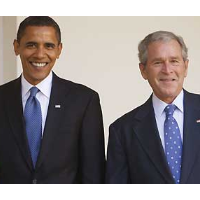U.N. Inspectors Flee Syria…Obama Pulls a George W. Bush in Iraq

Washington’s current march to war on Syria, although it is being led by the Democratic administration of President Barack Obama, bears a disturbing resemblance to the war fever efforts of the George W. Bush White House in 2002-2003. Nevertheless, Obama’s supporters insist that key differences between the situations in Iraq and Syria, and the more limited nature of Obama’s public proposals for action, outweigh the similarities. But not all the differences work in Obama’s favor.
Once again, a U.S. administration is advocating military action against a Middle Eastern country on the grounds that it allegedly possesses and has used chemical weapons. Both Iraq’s Saddam Hussein and Syria’s Bashar al-Assad came from religious minorities (Alawites, Sunnis) and built their political base on Ba’athism, a pan-Arab, quasi-socialist, secular ideology strongly opposed by and to the various forms of Islamic-based politics. Both their regimes earned reputations for brutally crushing dissent and for lavishly rewarding their supporters.
Like ten years ago, the administration is urging that the evidence against Syria—that it used sarin gas against civilians on August 21—is unequivocal, even though the United Nations inspectors charged with determining the facts have not yet completed their investigation. Last weekend, the Obama administration seemed to take a page from its predecessor’s playbook by demanding cancellation of the inspectors’ visit to the site of the alleged chemical attack, after first demanding that the team be given unfettered access.
As it turned out, in 2003 the Bush administration had pre-decided that it wanted to invade Iraq regardless of what the U.N. inspectors found. Statements by President Obama (“We have concluded that the Syrian government in fact carried these out,” but “no decision” on action has been made), Secretary of State John Kerry and others strongly suggest that this administration, too, does not want to wait for all the facts.
In fact, the U.N. inspectors left Syria hastily last weekend, just as they exited Iraq ahead of schedule in 2003, leading many to believe they’d heard word of an imminent attack. That speculation, however, was squelched by the surprising vote Thursday in the House of Commons rejecting British participation in an attack. It now appears that the U.N. inspectors will have time to present their results before any attack by the U.S. and its allies.
The lack of allies, most notably the U.K., willing to go along for the ride is perhaps the most glaring distinction between 2003 and 2013. At present, only France—ironically, the nation most heavily criticized by the American right in 2003 for refusing to join the invasion of Iraq—has signed up for the adventure, and President François Hollande is under increasing pressure to emulate Obama and allow the French Parliament to vote on the issue as well.
Another key difference, according to those who support the president, is that he is proposing only a limited intervention in Syria, while Bush advocated invasion and regime change. Indeed, the administration seems to be suggesting only airstrikes or missile strikes—and it has been adamant that it has no intention of putting American “boots on the ground” in Syria, although Kerry’s comments to the Senate Foreign Relations Committee on Tuesday left some people feeling uncomfortable.
But can the administration keep that promise? Can it manage the unforeseen and unforeseeable consequences of an American attack on Syria, including the possibility of victory by armed elements of the Syrian opposition allied with al-Qaeda? Will the message received be the message the administration intends to send?
Those are questions worthy of Congressional debate.
-Matt Bewig
To Learn More:
UN Orders its Inspectors out of Syria in Anticipation of Strikes (by Julian Borger and Paul Lewis, the Guardian)
In Rush to Strike Syria, U.S. Tried to Derail U.N. Probe (by Gareth Porter, IPS News)
Iraq Redux? Obama says 'Trust Us' as UN Retreats from Syria (by John Queally, Common Dreams)
The Cost of Ignoring UN Inspectors: An Unnecessary War with Iraq (by Greg Thielmann, Arms Control Now)
- Top Stories
- Unusual News
- Where is the Money Going?
- Controversies
- U.S. and the World
- Appointments and Resignations
- Latest News
- Trump Orders ICE and Border Patrol to Kill More Protestors
- Trump Renames National Football League National Trump League
- Trump to Stop Deportations If…
- Trump Denounces World Series
- What If China Invaded the United States?






Comments